
Hide (Movie Review)
K.C. Bascombe's stylish 2008 action/thriller "Hide" is a great place for anyone to witness flagrant, unabashed Tarantino worship in full swing. The DVD cover even proudly proclaims this fact as if it were a good thing, not realizing that Tarantino has already tackled a similar "Bonnie & Clyde"-esque scenario with Oliver Stone's gloriously over-the-top 1994 epic "Natural Born Killers." Wearing influences so loudly on one's sleeve is never a good thing, especially if you don't have the skill or the talent to replicate the work of your idols. Had the faux cool dialogue and the Robert Rodriguez-inspired soundtrack not seeped into every unclogged pore of the film, perhaps it wouldn't have rubbed me the wrong way.
This is an element of modern horror that is slowly robbing the genre of its originality and its creativity. Are ideas in such short order these days that you have to constantly pay homage to the films that influenced you? Does your script really need pop culture name-checking and nods to scenes you've lifted from superior pictures? Not quite. Inspiration is one thing, stealing components outright is another. If I wanted to watch a film directed by Quentin Tarantino or Robert Rodriguez, I wouldn't have slipped "Hide" into my DVD player. I would have simply watched "Pulp Fiction." Or, perhaps, "Spy Kids." Don't judge me.
The opening scene of Bascombe's dodgy cinematic miscalculation is lifted almost directly from Tarantino's 1994 masterpiece, right down the punchy dialogue and the sudden pre-credit freeze frame. Don't get me wrong -- it's a great scene, and it would've worked had it not reminded me of another film which used this scenario to greater effect. To be fair, it's a clever way to introduce us to ultra-violent outlaws Billy (Christian Kane) and Betty (Rachel Miner), but its impact is lost entirely because you know it came from somewhere else. Not from the imagination of the writer or the direction, but from someone who thought Tarantino's scene would work splendidly in his own motion picture. What's more, Billy and Betty are definitely not in the same league of cool as Pumpkins and Honey Bunny.
After this painfully familiar sequence has run its course, the rest of the story begins to take shape. Seven years later, during a routine prison transfer, Billy is rescued by his now-estranged girlfriend Betty, who uses a semi truck to liberate her beefy lover from his captures. Their reunion is tense, mostly because Billy believes his girlfriend to be an unfaithful whore who slept around in order to keep herself alive. They do, of course, eventually make up, and immediately plot a course for the town where Billy stashed a large bundle of stolen money on the day he was arrested by local police.
Along the way, they'll encounter randy rednecks in rundown gas stations, experience a plethora of informative flashbacks, and argue endlessly about this, that, and the other. To round things out, there's a "torture porn" subplot, too, in case you were already confused on how to label Bascombe's genre-bending endeavor. "Hide" runs the gamut, packing as much insanity into its breezy 90-minutes as possible without oversaturating this setup with silliness. In fact, the last half-hour or so is surprisingly creepy, leaving one to ponder why Bascombe and screenwriter Greg Rosati waited so long to find a serviceable plot for their wandering story.
The film's saving grace comes in the form of Christian Kane and Rachel Miner, two fine young actors who do a fabulous job of delivering massive amounts of pointless dialogue. Miner in particular is outstanding, and her southern accent is surprisingly well-executed. Kane, meanwhile, holds his own when he isn't required to show too much emotion. However, once things start getting intense and his character begins to unravel, the cracks in his performance begin to show. Beth Grant of "Donnie Darko" fame is also on-board for a few key scenes. Blink, I'm afraid, and you'll miss her.
A famous screenwriter once told me that it’s all been done before, and I tend to believe he’s absolutely right. However, there are ways to hide your borrowed ideas and unoriginal formulas without pointing directly to the material which inspired it. “Hide” isn’t an inherently bad film -- it's just a frayed cinematic patchwork pieced together from various sources. Bascombe is a promising director, and the picture houses a number of solid performances from its able cast. Were it not for a somewhat muddled twist and the fact that you know exactly where some of these scenes came, “Hide” wouldn’t have irritated me as much as it has. Imitation is the sincerest form of flattery, except, you know, when you’re straight jacking ideas from better artists.

